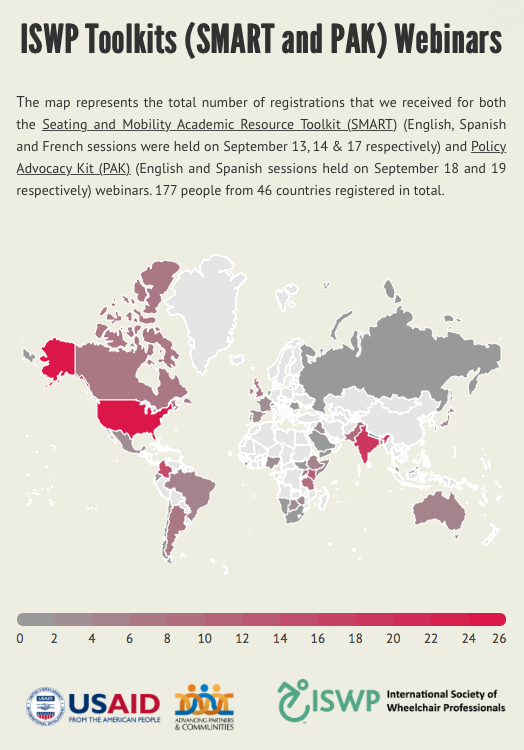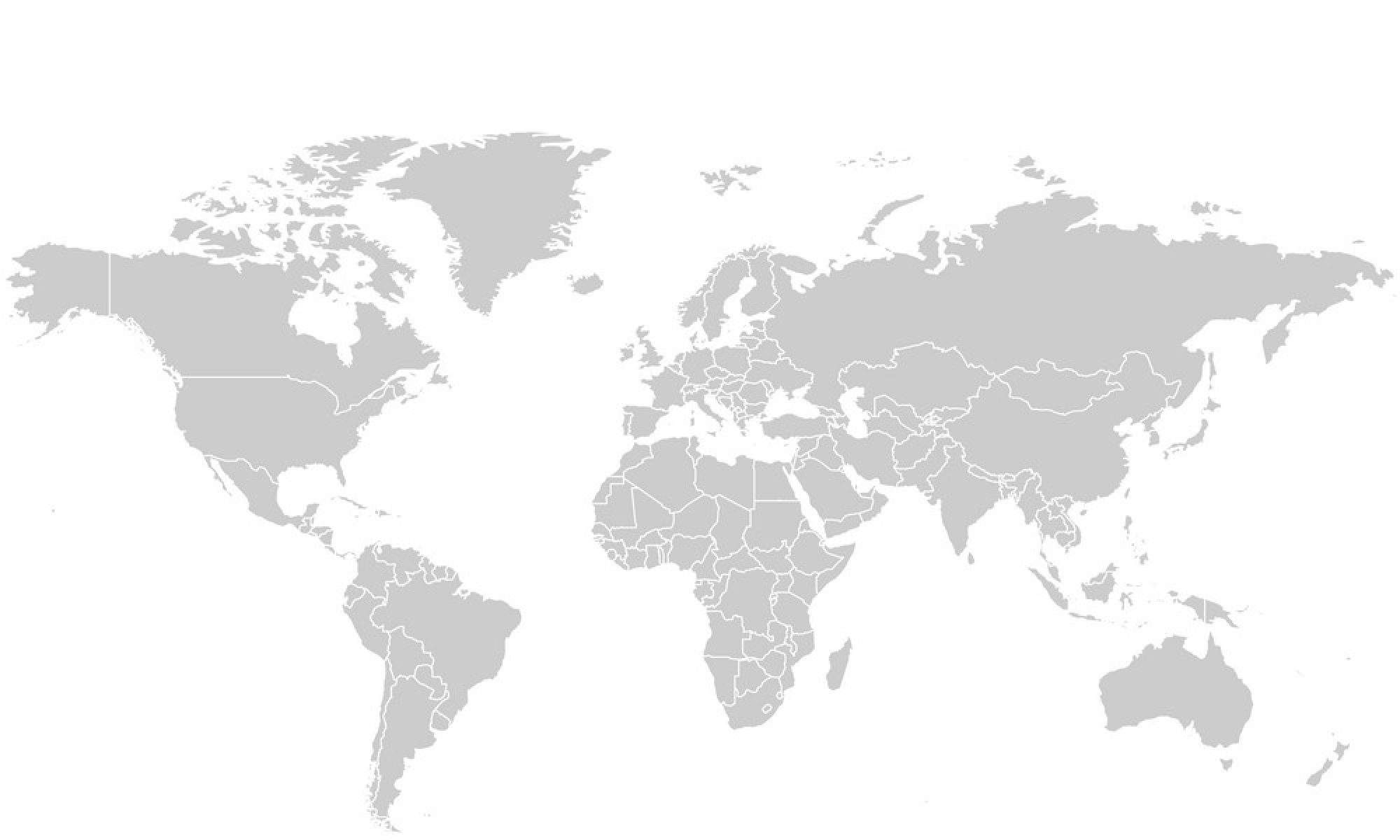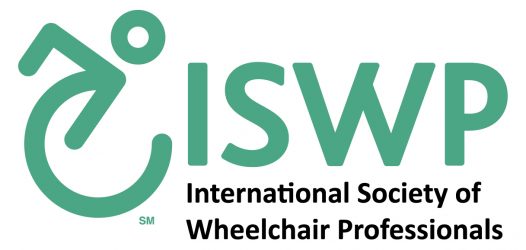Welcome to the Wheelchair International Network › Forums › Training Working Group Updates › TWG Update – December 2018
- This topic has 0 replies, 1 voice, and was last updated 5 years, 11 months ago by
Krithika Kandavel.
-
AuthorPosts
-
December 13, 2018 at 2:53 pm #9944
Krithika Kandavel
Keymaster1. Seating and Mobility Academic Resource Toolkit (SMART): SMART now has resources from 6 universities. Webinars in English, Spanish and French took place in September; the sessions were recorded and are available in the website here: http://smart.dev.wheelchairnetwork.org/smart-webinar-recordings/
If you would like to contribute your resources to SMART, please directly upload them here: http://smart.dev.wheelchairnetwork.org/contributions/

2. Publications:
‘The International Society of Wheelchair Professionals (ISWP): A resource aiming to improve wheelchair services worldwide’ editorial was published in the British Journal of Occupational Therapy. Review the article here: http://smart.dev.wheelchairnetwork.org/wp-content/uploads/2018/09/0308022618793056.pdf‘Implementation of the hybrid course on basic wheelchair service provision for Colombian wheelchair service providers’ was published in PLOS one. Review the article here: http://dev.wheelchairnetwork.org/wp-content/uploads/2018/10/journal.pone_.0204769.pdf
3. Upcoming Workshops
ISS, March 2019: The ISWP team was approved to lead a four-hour pre-conference session on ISWP training tools on March 18th 2019 at 8:00 am U.S. EST . Please register here if you are interested in participating.RehabWeek 2019: ISWP team will be conducting a 90 mins workshop titled ‘ISWP Training Tools You Can Use’ on June 24th 2019.
4. CUGH Grant: As part of the training activities of the Consortium of Universities for Global Health (CUGH) grant, ISWP facilitated a one-day in-person training on November 8th in Mexico City. Ten rehabilitation professors from 4 different states in Mexico who work at private and public Universities in the School of Physical Therapy and Occupational Therapy were trained by Yohali Burrola-Mendez and Norma Jimenez. During the training, participants experienced in-person activities of the assessment and prescription (step 1 and 2 of the WHO 8 steps for wheelchair service provision) and participated in a discussion forum on how to train those modules. Trained professors will return to their settings to replicate the training received with their students, who have completed online training. With these initiatives, ISWP continues to develop and evaluate flexible learning approaches to scale training worldwide. For more information, contact Yohali Burrola-Mendez at [email protected]
5. Academic Training Partners: The academic training partners have had 15 calls to date. The most updated lessons learned document is posted here: http://smart.dev.wheelchairnetwork.org/academic-training-partners-lessons-learned-document/
6. Professional Standard Board Status: The ISWP Professional Standards Board members are currently reviewing the Continuing Professional Development (CPD) and the seating assessment sheet. We plan to do a soft launch in December through The Hub newsletter. The paywall for accepting credential fees will be ready in mid-January.
7. Mentoring status & updates
Over the past 12-weeks, ISWP has worked with 3 renowned trainers to provide online mentoring to 8 intermediate wheelchair service providers around the world. Dietlind Gretschel, Tchai Xavier, and Bart Van Der Heyden facilitated discussions on unsupported sitting posture, pelvis and hip posture screen, temporary supports, hand simulation, PSDs (postural support devices), and fitting using the WHO WSTP and other developed content as learning tools. In addition to group sessions, mentors met with participants individually to tailor the program to their specific needs and focus on professional development goals related to wheelchair service provision. The purpose of the mentoring program is to advance service providers’ clinical reasoning skills with the result of providing the best services to their clients. Therefore, throughout the program, the 8 service providers who represented Jordan, Israel, Uganda, Kenya, India, and Lebanon, submitted case studies on intermediate level clients from their own service for feedback from their assigned mentor and peers. As the program ends, participants will complete assessments to determine their level of satisfaction with the program, as well as their self-efficacy in delivering intermediate level wheelchair services and will receive a certificate of completion from ISWP. For more information about the mentoring program, please contact Alexandria Miles at [email protected]8. ISWP Wheelchair Service Provision Basic Test
During 2018, 884 individuals from 31 countries took the ISWP Basic test. Since its launch, 3,056 individuals from 90 countries have taken the Basic test. The test is available in 14 languages (Albanian, Arabic, English, French, Hindi, Khmer, Lao, Mandarin, Portuguese, Spanish, Romanian, Russian, Urdu and Vietnamese) and is in the process of being translated into French-Canadian.Through a separate grant by the Paralyzed Veterans of America, Mary Goldberg is developing and evaluating a Basic skills assessment which will be pilot tested in 2019.
9. ISWP Wheelchair Service Provision Intermediate Knowledge Test
During 2018, 147 individuals from 6 countries took the ISWP Intermediate Knowledge test. Since its launch, 441 individuals from 13 countries have taken the Intermediate knowledge test.10. Wheelchair International Network (WIN)
WIN (https://dev.wheelchairnetwork.org/) has 1,222 users from 67 countries; the number of users increased 96% since January 2018. -
AuthorPosts
- You must be logged in to reply to this topic.

